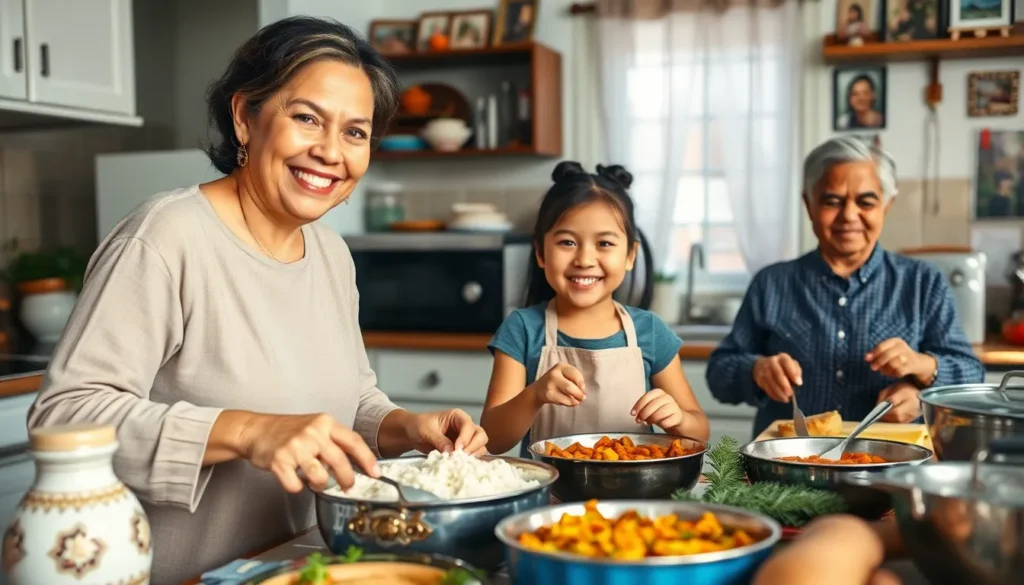Family tradition educators play a vital role in preserving the rich tapestry of cultural heritage within families. They help bridge the gap between generations by teaching values, customs, and practices that define a family’s identity. In an ever-changing world, these educators ensure that cherished traditions aren’t lost but rather celebrated and passed down.
By engaging with family members of all ages, they create meaningful connections that foster a sense of belonging and continuity. Whether it’s through storytelling, cooking traditional recipes, or participating in annual rituals, family tradition educators empower individuals to embrace their roots and cultivate pride in their heritage. As families navigate modern challenges, the wisdom of these educators becomes more valuable than ever.
Table of Contents
ToggleUnderstanding Family Tradition Educators
Family tradition educators play a crucial role in reinforcing cultural heritage across generations. They guide families in teaching values, customs, and practices essential to their identity.
Definition and Role
Family tradition educators are individuals who facilitate the transmission of cultural heritage within families. They utilize various methods, including storytelling, cooking traditional recipes, and leading rituals, to engage family members. They aim to strengthen intergenerational bonds while instilling a sense of identity and pride in heritage. These educators often act as mentors, helping families navigate the complexities of modern life while honoring their traditional practices.
Importance in Communities
Family tradition educators significantly impact community cohesion and cultural identity. They create opportunities for families to gather and celebrate shared customs. By promoting these traditions, communities foster stronger relationships among members, enhancing social support networks. Additionally, family tradition educators contribute to the richness of cultural diversity, helping preserve unique practices that define community character. Engaging with these educators encourages broader participation and interest in local cultural events, benefiting residents collectively.
Benefits of Family Tradition Education

Family tradition education offers multiple advantages that enrich both families and communities. These benefits include preserving cultural identity and strengthening familial relationships.
Preservation of Culture
Family tradition educators serve as custodians of cultural heritage. They impart values, customs, and practices that define a family’s unique identity. By engaging in storytelling, sharing traditional recipes, and leading cultural rituals, these educators ensure that significant practices are not lost across generations. The emphasis on cultural transmission fosters respect for diversity and promotes appreciation for various traditions among family members and in the broader community.
Strengthening Family Bonds
Family tradition educators enhance interpersonal relationships within families. By creating shared experiences around traditions, they foster connections that transcend age and generations. Participating together in customs strengthens ties and encourages open communication, allowing family members to express their thoughts and emotions. Moreover, these collective activities instill pride in one’s heritage, contributing to a sense of belonging that enriches family unity and resilience.
Approaches Used by Family Tradition Educators
Family tradition educators employ diverse approaches to effectively impart cultural knowledge and values. These methods foster familial connections and encourage the celebration of heritage.
Storytelling Techniques
Storytelling serves as a vital method for family tradition educators. It helps convey cultural values and family histories through engaging narratives. Specific techniques include:
- Personal anecdotes: Sharing personal stories creates emotional connections and highlights the importance of experiences.
- Culturally relevant fables: Utilizing traditional tales conveys morals and teachings linked to cultural identity.
- Interactive storytelling: Involving family members in storytelling encourages participation and enhances retention of cultural lessons.
These techniques reinforce cultural understanding while promoting a sense of belonging among family members.
Hands-On Learning Experiences
Hands-on learning experiences complement storytelling by providing practical ways to engage with traditions. Family tradition educators frequently incorporate the following activities:
- Cooking sessions: Preparing traditional meals together fosters collaboration and reinforces culinary heritage.
- Craft workshops: Creating traditional crafts allows family members to explore their heritage through artistic expression.
- Ritual practices: Participating in cultural rituals cultivates respect and understanding of family traditions.
These experiences create memorable bonds and solidify cultural connections across generations.
Challenges Faced by Family Tradition Educators
Family tradition educators encounter several significant challenges that can impact their effectiveness in preserving cultural heritage. These challenges include the pressures of modernization and the need to balance tradition with innovation.
Modernization and Change
Modernization presents a substantial challenge. Families often prioritize contemporary values and lifestyles that may clash with traditional practices. Rapid technological advancements can overshadow cultural customs, leading to a decline in engagement with heritage activities. For example, increased screen time reduces opportunities for communal gatherings where traditions are typically shared. Additionally, urbanization often creates distance between extended family members, making it harder to pass down traditions effectively. Educators must continuously adapt their approaches to remain relevant and attract participation from younger generations.
Balancing Tradition with Innovation
Balancing tradition with innovation poses another challenge for family tradition educators. While preserving customs is crucial, integrating modern practices can attract participation and sustain interest. For instance, incorporating social media for storytelling or hosting virtual workshops can enhance accessibility. However, this blending can create tension among family members who may resist changes to traditional practices. Educators must navigate these dynamics carefully, fostering dialogue and emphasizing the importance of both tradition and innovation. This balance not only engages families but also ensures cultural relevance in an evolving society.
Family tradition educators play a crucial role in nurturing cultural heritage within families and communities. Their dedication to teaching values and customs ensures that traditions thrive despite modern challenges. By fostering meaningful connections through storytelling and hands-on experiences, they create a vibrant tapestry of shared memories that enrich family life.
As these educators navigate the complexities of tradition and modernity, their efforts are vital in promoting understanding and respect for diverse cultural identities. The impact of their work extends beyond individual families, contributing to stronger communities united by shared heritage. Embracing the guidance of family tradition educators can lead to a deeper appreciation of one’s roots while fostering a sense of belonging in an ever-changing world.



